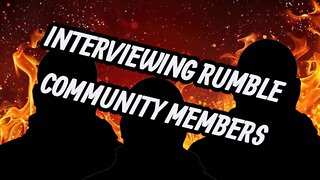Premium Only Content

Pop Song 529 of 1000 'Black Betty' Ram Jam 1977 version, Lead Belly 1939
Pop Song 529 of 1000 'Black Betty' Ram Jam 1977 version, Lead Belly 1939
Watch the MV https://www.youtube.com/watch?v=I_2D8Eo15wE
"Black Betty" (Roud 11668) is a 20th-century African-American work song often credited to Huddie "Lead Belly" Ledbetter as the author, though the earliest recordings are not by him. Some sources say it is one of Lead Belly's many adaptations of earlier folk material
The origin and meaning of the lyrics are subject to debate. Historically, the "Black Betty" of the title may refer to the nickname given to a number of objects: a bottle of whiskey, a whip, or a penitentiary transfer wagon.
David Hackett Fischer, in his book Albion's Seed: Four British Folkways in America (Oxford University Press, 1989), states that "Black Betty" was a common term for a bottle of whisky in the borderlands between northern England and southern Scotland; it later became a euphemism in the backcountry areas of the eastern United States. In January 1736, Benjamin Franklin published The Drinker's Dictionary in the Pennsylvania Gazette offering 228 round-about phrases for being drunk. One of those phrases is "He's kiss'd black Betty."[2][3] Other sources give the meaning of "Black Betty" in the United States (from at least 1827) as a liquor bottle
In Caldwells's Illustrated Combination Centennial Atlas of Washington Co. Pennsylvania of 1876, a short section describes wedding ceremonies and marriage customs, including a wedding tradition where two young men from the bridegroom procession were challenged to run for a bottle of whiskey. This challenge was usually given when the bridegroom party was about a mile from the destination-home where the ceremony was to be had. Upon securing the prize, referred to as "Black Betty", the winner of the race would bring the bottle back to the bridegroom and his party. The whiskey was offered to the bridegroom first and then successively to each of the groom's friends.[6]
John A. and Alan Lomax's 1934 book, American Ballads and Folk Songs describes the origins of "Black Betty":
"Black Betty is not another Frankie, nor yet a two-timing woman that a man can moan his blues about. She is the whip that was and is used in some Southern prisons. A convict on the Darrington State Farm in Texas, where, by the way, whipping has been practically discontinued, laughed at Black Betty and mimicked her conversation in the following song." (In the text, the music notation and lyrics follow.)
— Lomax, John A. and Alan Lomax, American Ballads and Folk Songs.
John Lomax also interviewed blues musician James Baker (better known as "Iron Head") in 1934, almost one year after Iron Head performed the first known recorded performance of the song.[7] In the resulting article for Musical Quarterly, titled "'Sinful Songs' of the Southern Negro", Lomax again mentions the nickname of the bullwhip is "Black Betty".[8] Steven Cornelius in his book, Music of the Civil War Era, states in a section concerning folk music following the war's end that "prisoners sang of 'Black Betty', the driver's whip."[9]
In an interview conducted by Alan Lomax with former Texas penal farm prisoner Doc "Big Head" Reese, Reese stated that the term "Black Betty" was used by prisoners to refer to the "Black Maria" — the penitentiary transfer wagon.
Whoa, Black Betty (Bam-ba-lam)
Black Betty had a child (Bam-ba-lam)
The damn thing gone wild (Bam-ba-lam)
She said, "I'm worryin' outta mind" (Bam-ba-lam)
The damn thing gone blind (Bam-ba-lam)
I said oh, Black Betty (Bam-ba-lam)
Whoa, Black Betty (Bam-ba-lam)
Whoa, Black Betty (Bam-ba-lam)
Whoa, Black Betty (Bam-ba-lam)
She really gets me high (Bam-ba-lam)
You know that's no lie (Bam-ba-lam)
She's so rock steady (Bam-ba-lam)
And she's always ready (Bam-ba-lam)
Whoa, Black Betty (Bam-ba-lam)
Whoa, Black Betty (Bam-ba-lam)
Get it!
Whoa, Black Betty (Bam-ba-lam)
Whoa, Black Betty (Bam-ba-lam)
She's from Birmingham (Bam-ba-lam)
Way down in Alabam' (Bam-ba-lam)
Well, she's shakin' that thing (Bam-ba-lam)
Boy, she makes me sing (Bam-ba-lam)
Whoa, Black Betty (Bam-ba-lam)
Whoa, Black Betty
Bam-ba-laaam, yeah, yeah
-
 3:38
3:38
Cyrus Saladin Ming
7 months agoPop Song 639 of 1000 'I Am the Walrus' The Beatles 1967
117 -
 4:36:53
4:36:53
MattMorseTV
5 hours ago $8.96 earned🔴Sunday Gaming🔴
34.7K1 -
 LIVE
LIVE
Joker Effect
1 hour agoINTERVIEWING Rumble Gaming community members: Viewbotting and how they see the current landscape.
521 watching -
 1:45:53
1:45:53
Nerdrotic
4 hours ago $9.04 earnedUnravelling the Secrets of Skinwalker Ranch | Forbidden Frontier #115
55.8K4 -
 41:56
41:56
Athlete & Artist Show
5 hours ago $0.27 earnedAustin Ekeler: Going From "0 Star Recruit" To Leading The NFL In TD's, New Fan App | FROM THE VAULT
7.53K1 -
 2:46:49
2:46:49
Barry Cunningham
10 hours agoNOW THEY FEAR US! | RFKJR STRIKES BACK | JD VANCE ON PRESIDENT TRUMP | AND MORE NEWS!
51.6K34 -
 LIVE
LIVE
Spartan
4 hours agoCharlotte Qualifier watch party + Ranked and Expedition 33
99 watching -
 6:09:54
6:09:54
bigbossrobinson
8 hours agoLIVE - DOUBLE IMPACT - RESIDENT EVIL 4 & METAL GEAR SOLID Δ: SNAKE EATER
21.8K -
 8:18
8:18
MattMorseTV
6 hours ago $5.81 earned2.2 MILLION in ONE YEAR.
35.1K122 -
 14:37
14:37
Colion Noir
9 hours agoCanadian Police Chief Urges Citizens To Comply With Home Invaders And Hide
72K88